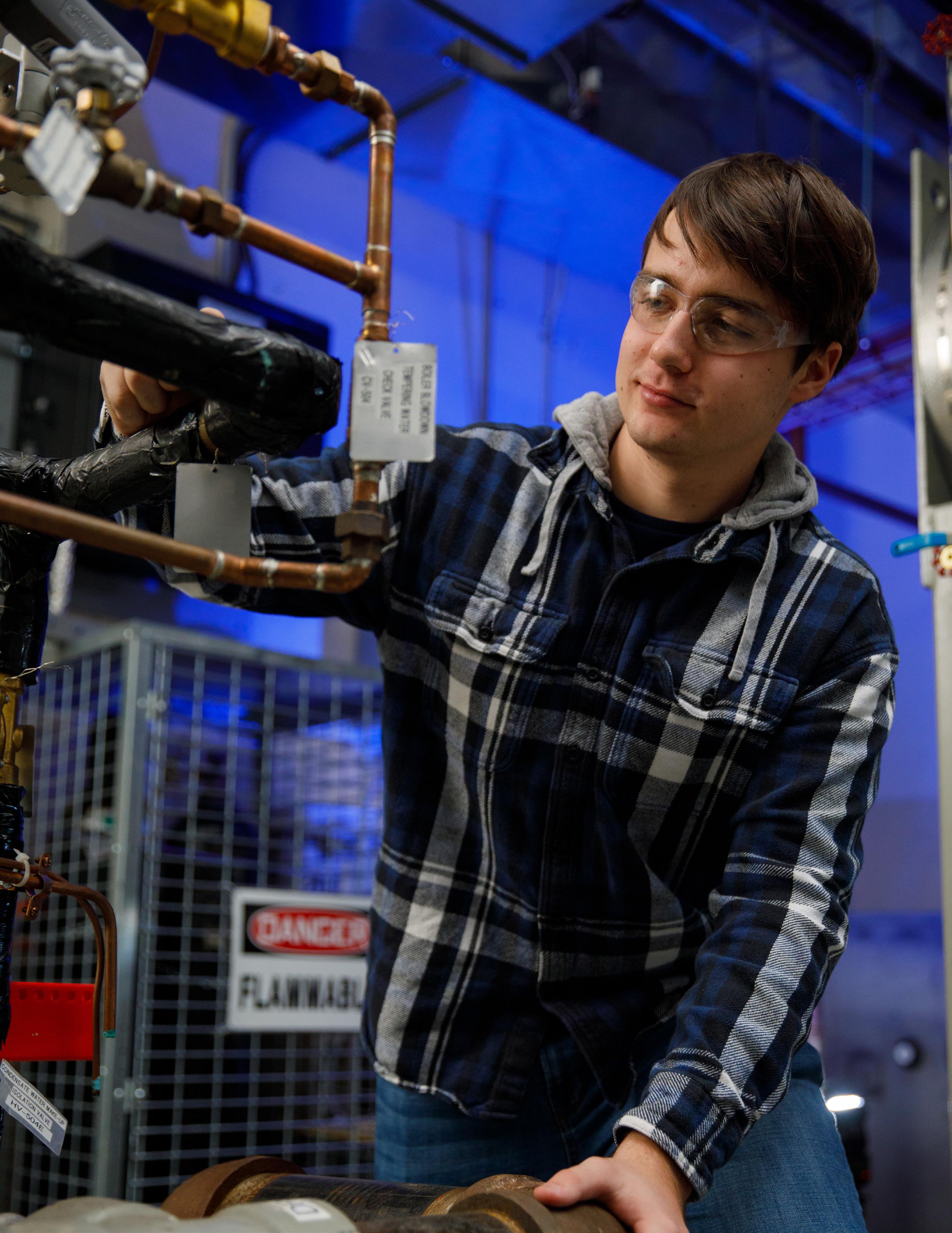
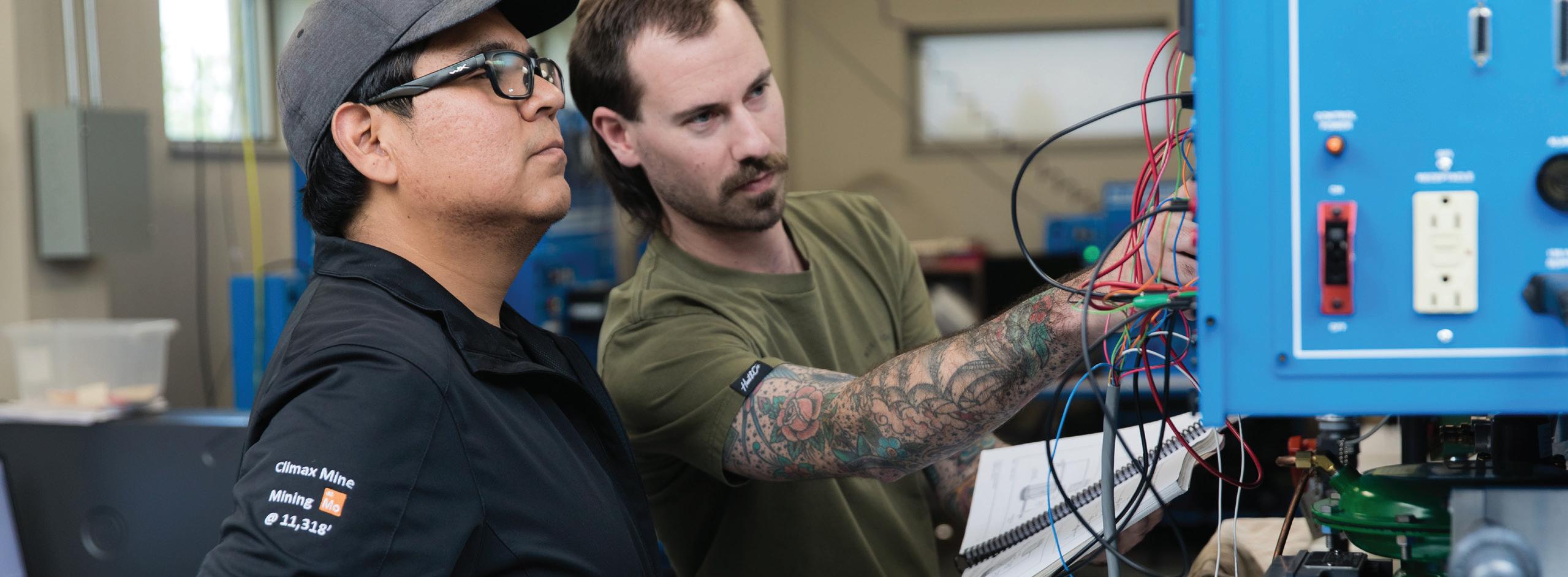



Learn powerful lessons about the transmission and distribution of electricity in the utility industry. You’ll acquire a core set of skills and competencies studying the components, design and operation of the electrical system, its equipment, and safety procedures. After completing core courses, you’ll choose one of four program specializations: line construction, substation, metering or system design.
CAREERS
$71.3K AVERAGE SALARY
Substation Technician System Protection Technician
Meter Technician Electric Field Planner
Energy Services & Renewable Technician
Prepare for field service technician careers in the rapidly expanding energy industry with an Energy Services & Renewable Technician degree. In this program, you will gain broad technician skill sets required in the conventional and renewable energy industry. Receive a broad background in energy production, electrical and mechanical fundamentals, equipment and systems, applied math and safety practices.
CAREERS $81K AVERAGE SALARY
Pipeline Technician
Renewable Technician
Generator Technician Wind Technician
Certificates available in Mechatronics I, Mechatronics II, Energy Services and Renewable Technician.
Electrician Technician
Prepare for a career as an electrician in residential, commercial or industrial settings through hands-on and applied learning. This program builds the practical skills needed to install, maintain, and repair electrical systems in residential and commercial structures, and prepares graduates to work in industrial environments such as power plants, refineries, manufacturing facilities, and food processing plants.
CAREERS $77.3K AVERAGE SALARY
Residential Electricians Industrial Electricians
Commercial Electricians
Electrical Transmission Systems Technology
Learn all about the electrical power systems in North America, including basic electricity, generation, distribution and transmission, with a strong emphasis on system operations. Courses in this program are approved for North American Electric Reliability Corporation (NERC) continuing education hours (CEHs) combined with college credit.
CAREERS $71.3K AVERAGE SALARY
System Operator Power Dispatcher
Power Marketer Energy Trader
Electronics/Telecommunications
Technology
Your education will apply directly to the job market. You’ll learn in BSC’s modern laboratory and apply classroom theory. Coursework contains two semesters of digital electronics and classes in alternating current and direct current analysis, solidstate devices and active devices.
CAREERS $67.5K AVERAGE SALARY
Manufacturing Technician Network Technician
Repair Specialist Calibration Technician
Certificate available in Electronics Technology.
Prepare to install, maintain, repair, operate and troubleshoot physical machines and control systems used to automate tasks within an industrial process. Using project-based learning, you will complete a solid foundation of electronic, electrical, mechanical, control systems, robotic systems, and their integration to increase the productivity and efficiencies of industrial facilities.
CAREERS $67K AVERAGE SALARY
Industrial Automation Technician Biomedical Technician
Mechatronics Technician Field Automation Technician
Certificate available in Electronics Technology and Instrumentation and Control Technology.
Credit courses offered through BSC’s National Energy Center of Excellence can be used for industry training purposes. Employees can take one or more courses to develop their knowledge and skills for daily use, while earning credits towards a college degree.
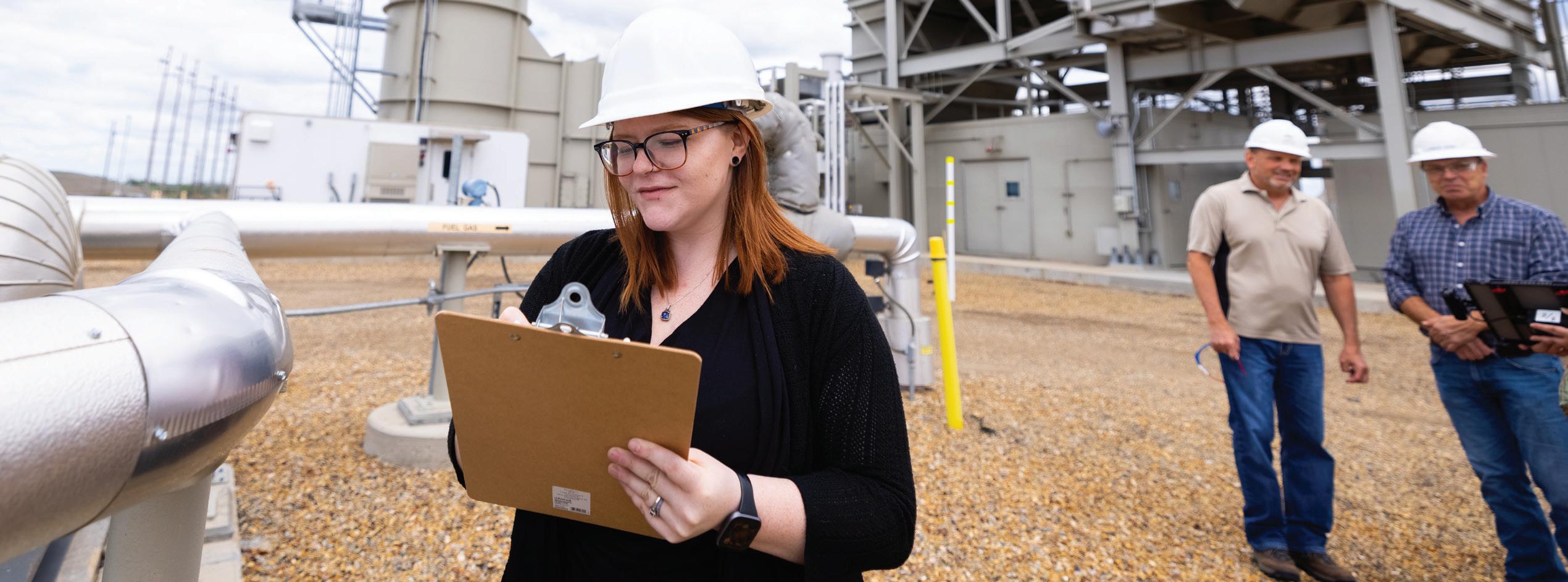
This program combines theory and hands-on training with state-of-the-art instruments, working processes and computerized control systems. You’ll learn to install, test, calibrate and maintain instruments that measure, indicate and control a range of variables. A limited number of students will be accepted to both the online and on-campus program.
CAREERS $76.3K AVERAGE SALARY
Instrument Technician Electronics Technician Controls Technician E & I Technician
Lineworker (Electrical)
The only one of its kind in North Dakota, this program is designed to train skilled apprentice lineworkers at the facility northwest of Mandan. You’ll receive intense instruction in all facets of powerline construction, equipment operation and maintenance. Study includes classroom instruction, indoor and outdoor lab work, and courses to prepare for the state commercial driver’s license (CDL) exam.
CAREERS $87.2K AVERAGE SALARY
Apprentice Lineworker Construction Lineman Journeyman Lineworker Fiber Optic Lineman
Mechanical Maintenance Technology
Interested in the installation, maintenance and repair of mechanical equipment like compressors, pumps, valves and turbines? The Mechanical Maintenance Technology program at BSC prepares you with the hands-on skills needed to work as an industrial mechanic in industries such as power generation, oil and gas, biofuels, manufacturing, and food processing. Throughout this program, the focus is on safely installing, troubleshooting, repairing, and performing preventative maintenance on industrial equipment and systems.
CAREERS $67.5K AVERAGE SALARY
Maintenance Engineer
Industrial Technician
Machinery Mechanic Plant Laborer
Prepare for a career as a non-licensed nuclear power plant operator through BSC’s fully online Nuclear Power Technology program, approved by the Nuclear Energy Institute (NEI). Students gain the foundational skills needed to work in the nuclear industry, while current employees can advance into higher paying technical roles. In addition to a degree, students may earn the Nuclear Uniform Curriculum Program (NUCP) Certificate, developed in partnership with Constellation and BSC, recognizing completion of NEI’s rigorous program standards.
CAREERS $109K AVERAGE SALARY
Nuclear Technician Power Plant Operator Nuclear Power Operator
Get an in-depth look into industry operations and learn about the interrelationships involved with petroleum geology, exploration, drilling, production, transportation and processing. This program is designed to give you skills in operating and maintaining equipment in a safe and responsible manner. Study includes knowledge of mechanical, electrical, instrumentation, print reading, troubleshooting, safety, communication and chemical technology needed in petroleum operations.
CAREERS $86K AVERAGE SALARY
Pipeline Operator Production Operator
Reliability Operator Lease Operator
This program will prepare you for entry-level employment in the operation of industrial facilities where products such as natural gas, refined fuels, and oils, ethanol, biodiesel and food products are processed, as well as in power generation settings involving gas turbine, fossil fuel and renewable generation technologies. This program emphasizes the technical and safety aspects of plant operations, the responsibilities of plant operators, and the mechanical and industrial technologies required to work in energy production and related industries.
Power Plant Operator Water Treatment Technician
Refinery Operator Plant Operations Technician
Prepare for entry-level jobs in all types of water and wastewater treatment plants in this certificate-only program. Learn to apply knowledge of biological, chemical and mechanical processes and hands-on techniques applicable to plant operation. Curriculum includes laboratory testing and analysis for operational control and regulatory compliance with regard to operator responsibility and safety for communities, personnel and the environment.
CAREERS $63.5K AVERAGE
Wastewater Plant Operator Water Treatment Technician
Pretreatment Coordinator Water/Wastewater Engineer
Level up your career by earning an additional high-demand skill set with a focus on regulatory issues in the energy industry. The 18-credit Certificate in Environmental and Safety Regulations is designed to provide working industry personnel with the knowledge necessary to function in employee roles that involve safety and environmental oversight.
Safety Director Environmental Lead Risk Control Manager Safety & Training Specialist
Gain new opportunities and enhance your current career by obtaining skills in Unmanned Aerial Systems. With this certificate, you will develop skills to manage and plan flight operations, as well as collect and process imagery data for analysis. This certificate can be applied to multiple applications, including agriculture, energy, construction, emergency response, aerial videography and photography. Upon completion, you will be prepared to take the FAA 107c licensure exam.
Aerial Videographer UAS Avionic Technician
UAS Remote Pilot UAS Data Analyst
Geospatial Technologies are a powerful combination of location-based applications and tools used to collect and analyze data about locations on Earth. A combination of GIS, Unmanned Aerial Systems (UAS), and remote sensing, along with geographic field techniques, will be utilized to apply spatial information to business, science and technology.
GIS Technician GIS Analyst
Select programs receive funding from the U.S. Department of Labor; therefore, veterans and eligible spouses receive priority of service over non-covered persons. (20 CFR 1010)
Stack certificates to build into a 2- or 4-year degree. bismarckstate.edu/Certificates
Bismarck State College cannot guarantee the ability to earn any professional license in any field, in any state or territory. The list of states/territories where you may seek employment after completing the program is found at bismarckstate.edu/about/Student-Disclosure-Information
Our flexible, cost-effective, non-credit courses and training sessions are customized to improve job performance, increase productivity, meet licensing standards and advance the competitive edge of your organization.
• Apprenticeship Training topics include mechanical maintenance, metering, relay apparatus, substation electrician, system protection and telecommunications.
• Technical training includes operations, maintenance, instrumentation, automation, switchman training, oil and gas bootcamps, water and wastewater and more!
• BSC (BSC_001) is recognized by the North American Electric Reliability Corporation (NERC) as a continuing education provider that adheres to NERC CE Program Criteria. Training is offered in multiple formats including online, on site, or in BSC’s high-technology labs. Contact us to hear more about each specific offering.
BSC has the only Bachelor of Applied Science in Energy Management program in the nation. Offered entirely online, this four-year degree is designed to fill the strong industry demand for supervisors and managers. The program helps energy students and current workers maximize their potential for advancement within the industry.
$86.8K AVERAGE SALARY
Project Supervisor General Manager
Facility Supervisor Plant Manager
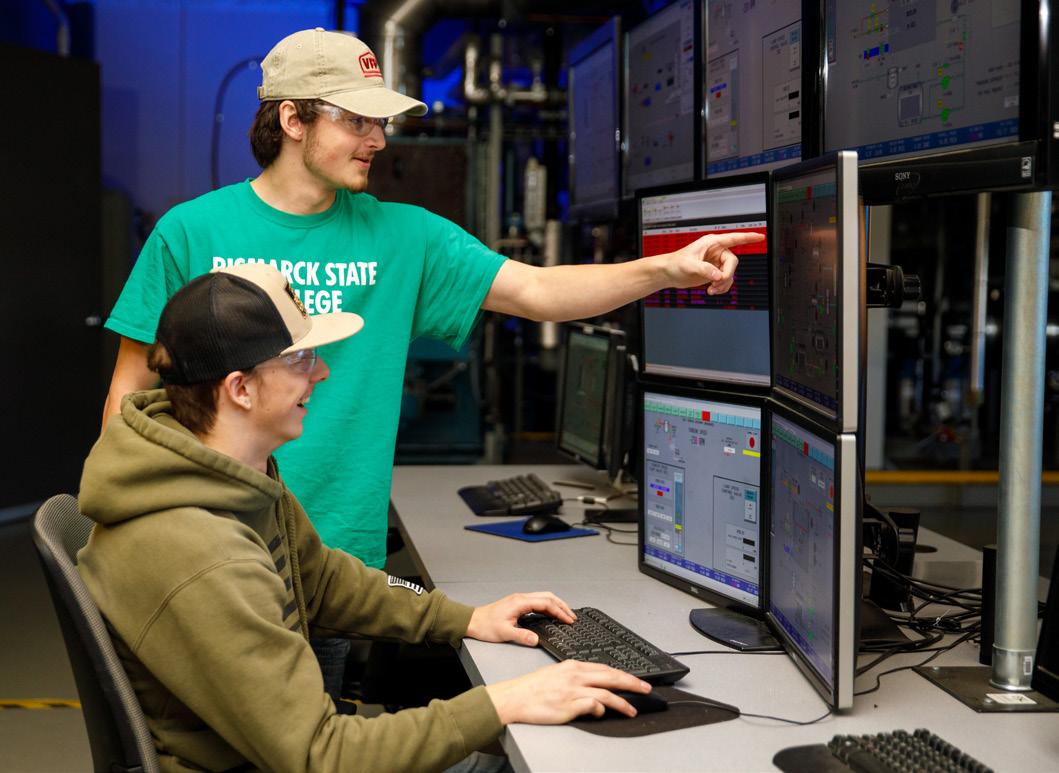
Prepare to work with smart devices that incorporate mechanical, electrical, computer and software components, such as robots, automated guided systems and computerintegrated manufacturing equipment. As industry advances and the complexity of technical systems continues to evolve, there is a need for qualified individuals to design and develop components and parts to produce safe and efficient automated equipment.
Production Design Tech Automation Engineer
Robotics Engineer Engineering Field Tech
Operations Management
Take your current industrial skill set or previous associate degree and improve them by earning a bachelor’s in Operations Management! Courses are delivered through online formats, providing greater flexibility for students and their work obligations. Upon completion of this program, students will be equipped to plan, direct, or coordinate the industrial work activities and resources necessary for manufacturing products in accordance with cost, quality, and quantity specifications. These abilities are essential when managing various facilities.
CAREERS $89K AVERAGE SALARY
Operations Manager Production Control Manager
Manufacturing Coordinator
The hands-on training and labs we did in class at BSC made the transition from classroom to work very smoothly. I believe the simtronics program that BSC implements really benefited me. Touring different plants helped me connect the classroom material to an actual plant while in school. The energy center houses a boiler and distillation replica that I trained on, which was a huge advantage for me.
-Nicole
The Fast Track program at BSC encompasses the non-traditional ways students may have earned college credit, including:
Dual Credit students enroll in a college course to receive both college and high school credit. These courses are usually taken at the high school or via interactive video. Early Entry students enroll in a college course to receive college credit. These courses are usually taken on the BSC campus or online.
BSC awards credit for Military Training Programs as outlined by the American Council on Education (ACE).
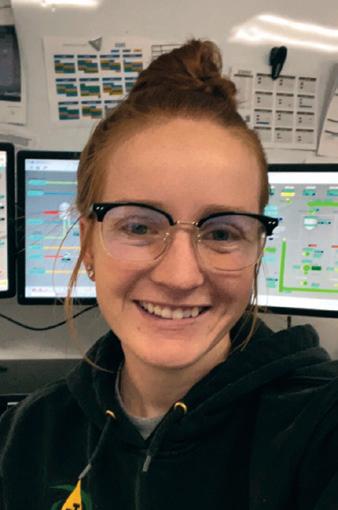
With CLEP (College-Level Examination Program), a student can earn college credit for what they already know on any of 34 CLEP examinations.
AP (Advanced Placement) courses are taken in high school. Students can receive college credit if they earn a 3 or higher on the exam.
Prior Learning Assessment (PLA) provides an opportunity for adults to earn college credit for knowledge and competencies they’ve gained outside the classroom.
